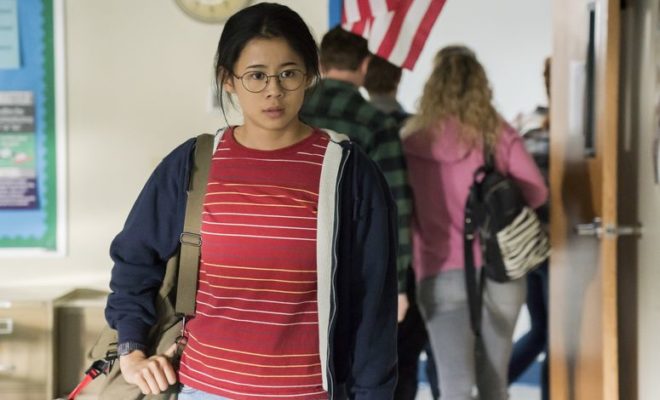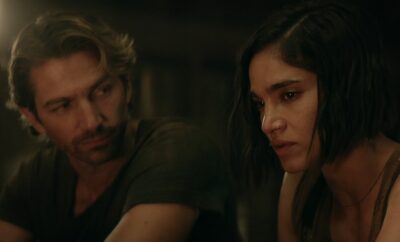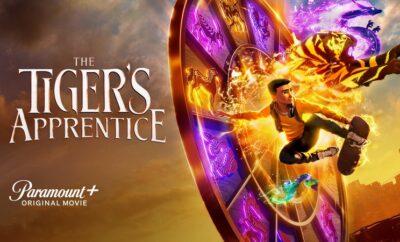 KC Bailey
KC Bailey
Interviews
Leah Lewis – The Half of It
By: Jamie Steinberg
Q) Ellie is described as a shy introvert. What about her life that keeps her so withdrawn?
A) I think one of the reasons that Ellie is so withdrawn, other than the fact that she is naturally a more introverted observer type human being, I think because she lives in a small town Ellie has never really had a large sense of community (I would say) for her to really express maybe in a more outward way. I think part of what made Ellie more to herself too is the fact that her mother passed when she was younger and I feel like ever since then her and her father have become a little more withdrawn and a little more serious actually as well. Two, every time you see Ellie in the film kind of talking to towns people it’s not really in a positive way. People call her “Chugga-Chugga Choo-Choo.” Sometimes people in the movie are like, “Oh! The Chinese girl.” So, I think Ellie has learned to keep her head down and follow the course that she knows to be a little bit safe in this town.
Q) This popular jock hires her to lend a hand with his love life. What is it about Ellie seeks her out for assistance?
A) I think it’s kind of well-known that Ellie writes papers for people at school and I think Paul (Daniel Diemer) just so desperately wants to get Aster’s (Alexxis Lemire) attention that his only way of doing that is asking the person who doesn’t write letters but she does write essays at school. And because he knows she may be willing to do that because of her business on the side.
Q) Throughout the movie Ellie journeys towards getting out of her shell and comfort zone. What are some things that lead her towards that evolution?
A) What starts to open Ellie up and out of her comfort zone a little more is doing things that she would normally never do. And that is all encapsulated in this one body named Paul. Paul shows up in her life and completely turns it around in the most positive of ways and he kind of begins a friendship with her for the first time in probably a very long time for Ellie. And the two of them go on this journey of friendship and they both start to open up to each other. I think Ellie is really seen for the first time by Paul and that is something that sort of brings her out of her skin. Ellie gets to know Aster more and she starts to find her voice and what really matters to her.
Q) Both Ellie and Paul end up being connected to Aster for different reasons. What is it about her that draws each of them to her so much?
A) I think that with Ellie, beyond Aster being a beautiful girl and a popular girl at school, she is very aware of Aster’s real emotions. She is this beautiful girl who is popular at school, but I think even before they get to know each other she can see through it. Ellie can that this girl has so much more depth than hanging out with Trig (Wolfgang Novogratz) and jumping around in the school parking lot. When the two start to get to know each other via letter and then in person as well, I think for the first time Ellie sees an intellectual equal. Someone else in this small town in high school understands where she’s coming from – I think that’s a really big realization for Ellie and comforting that someone out there is similar to the way she thinks. Whereas with Paul, he admittedly says in the movie, “I kind of like her because she is beautiful!” She even says that in one of her letters, “That’s why you’re writing me, right?” The two look at each other like, “Kind of!” [laughs] But I think Paul, too, as he starts to get to know her more, he starts to see the different layers to Aster and sees that she’s not just this pretty girl. And that’s a really cool discovery for both of them.
Q) Quite often the setting ends up being a character itself. How does where she live play a part in her storyline?
A) It’s kind of something that we touched on earlier. Where Ellie lives, she doesn’t have the room for exploration of certain things. That being her sexuality and her finding her voice in that area. Also, that Ellie is Asian. As far as we know, she and her father are the only Asian people in Squahamish. I think because of that kind of small-town conservative vibe it hasn’t created a place for Ellie and her father to freely do what they want and say whatever they want. So, they kind of stay within the confine of their own bubble.
Q) A strong female character can be defined in different ways. What would you say about Ellie exemplifies this trait and identity?
A) I think that Ellie is the best kind of hero because she doesn’t have all of the conventional hero qualities. I feel like the hero in all things is very loved, out there and is very quick to be a part of situations. What makes Ellie such a rich and incredible hero is that she is realistic. She is this girl who has dealt with living in this small town because she has dealt with her mother passing and she has dealt with the disconnect of having to live in Squahamish. And she charges on anyway! She knows what she has to do and is incredibly intelligent. And she has a lot of faith in people! You see how caring she is with her father who doesn’t have his wife anymore. You see the way she understands Paul and really takes that in. She is this full-fledged human being in this high school body who is very unaware of how cool she is. [chuckles] I kind of want to jump in the movie and tell Ellie, “Hey! You’re really, really cool! You do so many cool things!” She’s an avid reader and so smart and loving. She doesn’t even realize it until the end of the film.
Q) Cinematography can play into the tension and dynamics between characters. How did director Alice Wu use color, angles, etc. to play up the angst and tensions that are building up throughout the film?
A) I just want to give a huge shoutout, not just to Alice Wu but to our DOP Greta Zozula. Some of the shots that they came up with were…I mean, we had no clue what was happening while we were shooting. Alice never showed us anything, with good reason. But when I was watching the movie after for the first time I think a lot of light stuff was very, very important to kind of setting up this world around us. Also, the intimate shots. There are a lot of up-close reactions on the characters’ faces. I think those kinds of shots actually give the characters a bigger sense of intimacy with the audience. I noticed watching Daniel’s reactions up close, Alexxis’ reactions and even my reactions up close – I just could see everything that was going on with their faces. And I kind of love that because there is not much you have to do with a shot like that. You don’t have to go, “Oh whoa!” because the shot kind of does that for you. It really captures the emotions without the actor having to compensate. And just building this world, the colors…I don’t really know much about the way colors change things in film, but I can say that me – as a consumer – watching The Half of It I loved the coloring and it made me kind of warm and fuzzy inside.
Q) What do you hope viewers take away from watching the movie The Half of It?
A) I hope that viewers see a bit of themselves in this movie. Whether that be in the three main characters or whether that be in their parents or one of the kids in high school, I think there are so many different topics that this movie kind of houses that people can relate to. I just hope that they feel seen. Also, on top of that, I really hope that the actions in this movie encourage people in their lives make their bold strokes, whatever that may be.





You must be logged in to post a comment Login